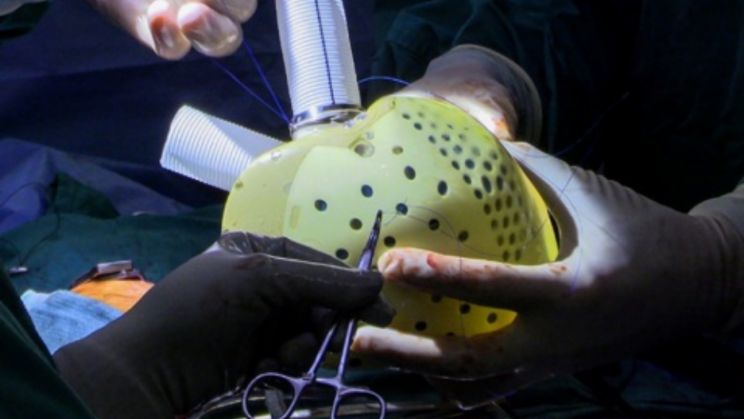1. One thing that helps

The WHO estimates that 17.9 million people die from cardiovascular disease each year. Heart donors are scarce, so the fact that Duke University Hospital surgeons have just transplanted a total artificial heart (TAH) into a patient is a huge advancement.
The recipient’s sudden heart failure left him unsuitable for a normal heart transplant. The TAH mimics the look and function of a real heart with the help of embedded sensors and microprocessors. Part of the TAH is external, requiring the patient to carry a 4-kilo bag that has controllers and battery packs. He’ll have to remember not to stray too far from a power point as the batteries need to be recharged approximately every 4 hours. Since the transplant, the recipient has remained in a stable condition.
Replacing our key organs with serviceable machines strikes me as a step closer to immortality. If the parts of our body that give up on us can be replaced is there a reason we need to die? However, if we can’t stop the deterioration of the mind and brain then there is little point keeping our bodies going. This is a topic that will be incredibly important as we further augment our bodies with technology.
2. One to be wary of
A catholic priest has been outed as gay without his consent and has resigned from his post after his app location data was purchased, reviewed and published by a Catholic blog.
The priest allegedly used the gay dating app Grindr, an app that was fined $11.7 million by the Norwegian Data Protection Authority for unlawfully sharing personal information. The location data from this app was then purchased by the blog from a “data vendor”. They then analyzed this data to pinpoint the locations the priest had allegedly visited, including his home, office, meetings, gay bars, and private residences.
This incident shows how easy it is for anyone to track and identify you using your phone. By correlating your location data to your phone ID, anyone can pinpoint where you’ve been. But it doesn’t just stop there. There are services that can easily identify a phone’s owner for you, for a price.
“I don’t care if my location is being tracked, I don’t have any secrets.” This is the most common thing I hear from friends when I get on my location privacy soapbox. Even if you are not going anywhere that could affect your personal or professional life if publicly revealed, this information can still be used in ways you are not aware of. Otherwise, why would it be commercially valuable?
My advice? Never hit the “always” option when apps ask when they can use your location. Only ever choose “while using the app”. Always assume that your location data will be sold to a vendor looking to profit off it. Because it will.
3. One to amaze
Dear distracted @SamvanRooy1, pls stay focused! pic.twitter.com/7EAV8VYE9m
— The Flemish Scrollers (@FlemishScroller) July 13, 2021
I’m sure question time is dull if you’re a politician, but we are paying for them to be there and make a difference. A new tool is now tracking how much time politicians spend staring at their phones whilst in session.
The tool called Flemish Scrollers employs facial recognition to identify politicians and tracks the time they spend looking at their phones. The Belgian government has been the initial target since their meetings are broadcast live on YouTube and are easily accessible to the AI. The percentage of time spent looking at their phones for each politician is then pushed to social media.
The goal of the developers is a noble one. They are looking to raise awareness around the dangers of facial recognition systems by putting the politicians directly in its crosshairs. Hopefully, being in the spotlight might encourage governments to raise the priority of legislation for privacy and data security. I bet a few of them wouldn’t want their location data tracked in a similar way to the priest we discussed earlier!